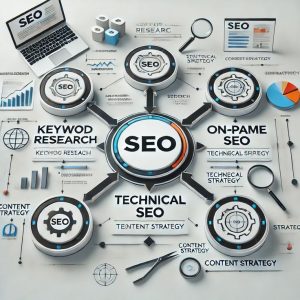What is SEO and Why Should You Optimize Your Website for It?

If you’re an online publisher or dream of carving a career in the ever-expanding world of digital publishing, you’ve almost certainly come across the term SEO (Search Engine Optimization). Whether you’ve encountered it before or not, understanding SEO is crucial for anyone looking to thrive in the online space. In this post, I’ll walk you through the essence of SEO and explain why it’s absolutely essential for the success of your website.
What is SEO (Search Engine Optimization)?
Simply put, SEO is the art and science of optimizing your website so that it ranks higher in search engine results pages (SERPs). When you perform SEO on your site, you’re essentially making it more discoverable to potential visitors or customers by aligning it with search engine algorithms.
We all rely on search engines like Google to find information online. When someone searches for a specific keyword, they are presented with a list of links. Naturally, the websites that appear at the top of the results get the most attention, and thus the most clicks.
If you want your website to be among the top results, you must employ effective SEO strategies. By doing so, you enhance your site’s visibility and increase the chances of attracting more traffic. This is why SEO is indispensable for anyone with an online presence.
Different Types of SEO
SEO can be divided into three distinct categories:
- On-Page SEO
- Off-Page SEO
- Technical SEO
Let’s dive into each one.
What is On-Page SEO?
On-Page SEO refers to the optimization techniques applied directly within the content of your website. From text and images to meta tags and URLs, everything that you can control on your site falls under On-Page SEO.
For example, if you run a website that reviews mobile phones, and you publish an article about the iPhone 11, you’ll be competing with countless other websites writing about the same device. To stand out, you need to ensure that your content is optimized in a way that helps search engines easily understand and rank it.
Why On-Page SEO Matters
When you publish content, search engines must be able to understand what your article is about. If you fail to communicate this effectively, your article might not show up in search results, or it could rank poorly. The core function of On-Page SEO is to ensure search engines can index and understand your content accurately.
To achieve this, consider the following techniques:
- Create SEO-Friendly Content
Keyword optimization is still a key element of On-Page SEO, but it’s no longer about overloading your article with keywords. Instead, focus on writing naturally and use related terms that Google can recognize. This helps signal to search engines exactly what your article is about. - Optimize Website Loading Speed
One thing we’ve all experienced is a slow-loading website. If a site takes too long to load, users are likely to bounce off. Google is well aware of this and considers site speed as an important ranking factor. A fast website not only improves user experience but also boosts your SEO performance. - Smart Use of Targeted Keywords
Keywords remain crucial, but the key is in moderation. Use your targeted keywords naturally, and strategically place them in key areas: the title, meta description, first paragraph, and header tags. This ensures that Google can easily identify the focus of your content and helps rank it appropriately. - Use Alt Tags for Images
Search engines cannot “see” images in the way humans do, so it’s vital to use alt tags to describe your images. This helps Google understand what each image is about, improving your SEO and potentially increasing traffic through Google Image Search. - Craft Readable and Engaging Content
Quality is key. No matter how many keywords you use, if your content isn’t engaging or easy to read, users won’t stick around. Write clear, concise, and compelling articles with short paragraphs, making it easier for visitors to absorb the information. - Leverage Internal Linking
Internal linking refers to linking your new content to other relevant articles on your site. This not only boosts SEO but also keeps users on your website longer, improving their overall experience.
What is Off-Page SEO?
While On-Page SEO focuses on improving elements within your website, Off-Page SEO refers to the actions taken outside of your website that help build its authority. This includes activities like backlinking and social media engagement.
How to Implement Off-Page SEO
Off-Page SEO strategies help establish your website as credible and trustworthy in the eyes of search engines. Here are a few effective methods:
- Build Backlinks
Backlinks are essential for building credibility. The more high-quality, relevant backlinks you have, the more authority your website gains. Seek backlinks from reputable sites within your industry to improve your site’s standing with Google. - Engage on Social Media
Social media engagement is an indirect yet powerful off-page SEO tactic. While social signals don’t directly impact rankings, they do drive traffic to your website. Maintain an active presence on platforms like Facebook, Instagram, and LinkedIn, and share your content regularly. - Submit to Directories and Forums
Participating in niche forums and submitting your website to directories can provide valuable backlinks. Engage in conversations, answer questions, and link back to relevant content on your website. - Guest Posting
Writing guest posts for other blogs in your industry is an excellent way to gain backlinks, increase traffic, and enhance your site’s credibility. Choose websites that are well-established and relevant to your niche. - Utilize YouTube
YouTube, being the second-largest search engine after Google, can be a powerful tool for SEO. Create videos based on your website content, and always include links back to your site in the video description to boost both traffic and backlinks.
Why SEO is Essential for Your Website
Now that we’ve covered the basics of SEO, let’s talk about why SEO is crucial for the success of your website:
- Increased Traffic
The main benefit of SEO is that it drives organic traffic to your website. Higher rankings mean more visibility, which ultimately leads to more visitors. - Improved User Experience
SEO is not just about rankings; it’s also about making your website more user-friendly. A well-optimized site that loads quickly, is mobile-friendly, and offers easy navigation enhances the user experience. - Cost-Effective
Unlike paid ads, SEO delivers long-term results. Once your site is optimized, you don’t need to keep paying for traffic—your content will continue to attract visitors without constant investment. - Builds Trust and Credibility
Websites that rank well are often perceived as more trustworthy. SEO helps build that credibility by ensuring your content is relevant, authoritative, and high-quality. - Better Conversion Rates
SEO helps attract the right audience to your site—those who are actively searching for what you offer. This targeted traffic is more likely to convert into customers or subscribers.
Conclusion: Invest in SEO for Long-Term Success
Whether you’re running a blog, an e-commerce site, or any other type of website, SEO is essential for growth and success in the digital world. By applying both On-Page and Off-Page SEO techniques, you can improve your website’s rankings, drive more traffic, and build long-term credibility.
If you haven’t already started optimizing your website, now is the time to do so. The more effort you invest in SEO today, the higher your chances of success tomorrow.
Ready to take your website to the next level? Multimedia Growth can help you optimize your site and improve its rankings. Get in touch with us today to start your SEO journey!
Email: info@multimediagrowth.com



